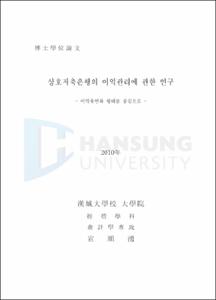상호저축은행의 이익관리에 관한 연구
= Earnings Management by Mutual Savings Bank : Focus on Income Smoothing Behavior
- Type
- Thesis
- Alternative Title
- 이익유연화 행태를 중심으로
- Advisor
- 홍용식
- Department
- 대학원 경영학과
- Issued Date
- 2010
- Publisher
- 한성대학교 대학원
- Files in This Item:
-
-
Download
 000000590725.pdf
기타 데이터 / 568.1 kB / Adobe PDF
000000590725.pdf
기타 데이터 / 568.1 kB / Adobe PDF
-
Items in Repository are protected by copyright, with all rights reserved, unless otherwise indicated.